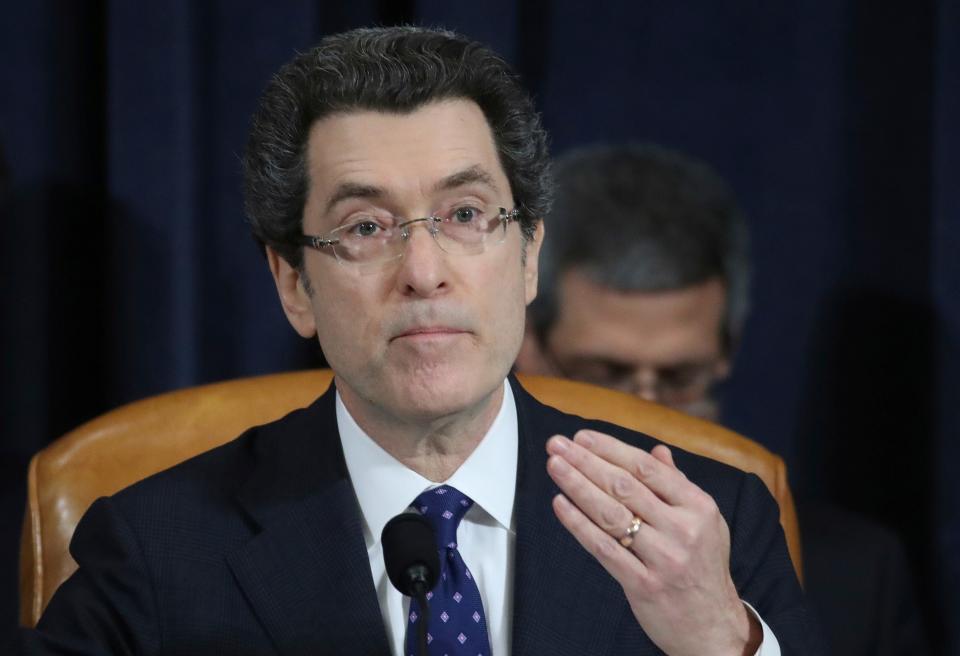Wisconsin impeachment threat has no merit in law. That won't stop Robin Vos from trying.
- Oops!Something went wrong.Please try again later.
- Oops!Something went wrong.Please try again later.
Baseless GOP impeachments seem to be a new national trend. Like his U.S. House counterpart Kevin McCarthy, Republican Speaker of the Wisconsin State Assembly Robin Vos is threatening to lead an utterly unfounded impeachment proceeding. In Vos’s case the target is newly-elected Wisconsin Supreme Court Justice Janet Protasiewicz, who he’s threatening to impeach before she even rules on a single case. As an impeachment expert who has worked on and written about impeachments, I have never seen one that would be as groundless as that of Protasiewicz.
The problem for Vos is that the impeachment is unjustified by any reasonable standard, although given his history of extreme partisanship that seems unlikely to stop him or his new hand-picked secretive panel of advisors who are evidently building his case for impeaching the newly-seated justice. None of the Wisconsin GOP’s allegations against Protasiewicz remotely reaches the exceptionally high standard for impeachment under the Wisconsin Constitution.
Vos and his allies want people to believe that Protasiewicz cannot rule fairly on a redistricting case. Why? Because, they claim, her campaign accepted contributions from the Democratic Party, which is not even a party to the case, and in an interview during the campaign she voiced her personal opposition to partisan gerrymandering.
Under Wisconsin law, Justice Protasiewicz alone determines recusal
In Wisconsin as elsewhere, judges and judges alone determine whether they should recuse themselves. For years, conservative justices in Wisconsin have, in fact, fought against setting recusal standards, and the Wisconsin Code of Judicial Ethics expressly states that judges need not recuse themselves solely on the basis of lawful campaign contributions.
Vos’s case for impeachment is weak and becomes even weaker upon reading the state’s constitution, which authorizes the legislature to impeach elected officials only for a narrow range of offenses: “For corrupt conduct in office, or for crimes and misdemeanors.” The GOP’s impeachment effort is completely unmoored from this legal standard.
To make matters even worse for Vos, the state’s Judicial Commission has already dismissed GOP-backed complaints that Protasiewicz’s campaign comments were unethical. The commission rightfully found that she was permissibly sharing her personal beliefs, without pledging or promising how she would rule in matters before the court.

Wisconsin Republicans have understood this legal distinction when it suits their purpose. Conservative Justice Brian Hagedorn has referred to Planned Parenthood as “wicked,” likened same-sex relationships to bestiality, and dubbed Christianity as the only “correct religion.” Before joining the court, conservative Justice Rebecca Bradley wrote that abortion rights equated to giving women the “right to murder their own flesh and blood.” Republicans have made no demands that these justices recuse themselves from cases about abortion, gay rights, or religion.
To put it simply, there is no reality in which Protasiewicz’s actions have met the impeachment standard. Indeed, former Wisconsin Justice David Prosser, who revealed to the Associated Press that he is a member of Vos’s secretive panel, “accepted donations from the state Republican Party when he was on the court” and “did not recuse from cases involving a law he helped pass as a lawmaker.” (For good measure, he also made a campaign contribution to Protasiewicz’s opponent.)
Impeachment meant to maintain Wisconsin's gerrymandered districts
The ultimate goal of impeachment is insidious: The most extreme gerrymandered Republican state legislature in the nation would unconstitutionally impeach a state supreme court justice, for the express purpose of preventing her from voting on a case that may undo the extreme gerrymander that keeps those same legislators in office. If this effort succeeds, there would be nothing left of an independent judiciary in Wisconsin: whenever the legislature didn’t like how a judge ruled, it could simply remove him or her with a simple majority vote in the Assembly. It would be farcical if it were not so frightening.
More perspectives from the Ideas Lab:
Thankfully, if the legislature returns to rattling the impeachment sword, there is hope that the rule of law may yet prevail. Courts in multiple states have exercised their power to review whether impeachment proceedings violate constitutional requirements. Indeed, just this year a Pennsylvania court threw out an unconstitutional impeachment.
Of course, if the legislature ultimately drops this charade, a court fight may not be necessary. But if Vos launches his impeachment, Wisconsin courts will undoubtedly see a case that asks a fundamental question: Will the Wisconsin judiciary permit the state legislature to eviscerate judicial independence through an impeachment that clearly violates both the state and federal constitutions? The answer is clearly no.
Norman Eisen is a senior fellow in Governance Studies at the Brookings Institution, executive chair of the States United Democracy Center, and a globally-recognized authority on law, ethics, and anti-corruption. He wrote this op-ed in his personal capacity, not on behalf of either organization. Eisen served as special counsel to the House Judiciary Committee, led by Democrats, for the impeachment of former president Donald Trump from February 2019 to February 2020.
This article originally appeared on Milwaukee Journal Sentinel: Wisconsin Supreme Court Justice Janet Protasiewicz may be removed

